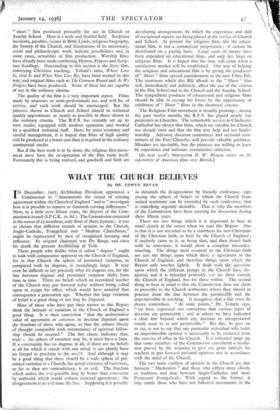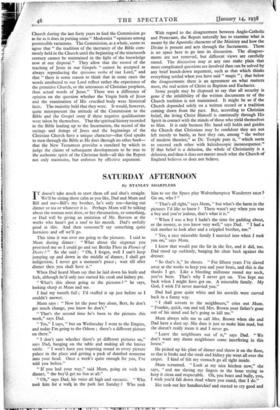WHAT THE CHURCH BELIEVES
By. DR. EDWYN BEVAN IN December, 1922, Archbishop Davidson appointed a Commission to " demonstrate the extent of existing agreement within the Church of England "and to " investigate how it is possible to remove or diminish existing differences." Now, in a little over fifteen years, the Report of the Com- mission is issued (S.P.C.K. 2S. 6d.). The Commission consisted at the outset of 25 members, only three of them laymen ; it was so chosen that different strands of opinion in the Church, Anglo-Catholic, Evangelical and " Modern Churchmen," might be represented by men of recognised learning and influence. Its original chairman was Dr. Burge, and since his death the present Archbishop 9f York.
Those people who dislike what is called " dogma " ought to look with comparative approval on the Church of England, for in that Church the sphere of permitted variation, as compared with its dogmas, is exceedingly large. It may even be difficult to say precisely what its dogmas are, for the line between dogmas and permitted variation shifts from time to time. There are beliefs which an accredited teacher of the Church may put forward today without being called upon to resign his. office, which would have entailed that consequence a generation ago. Whether this large variation of belief is a good thing or not may be disputed.
Most of those who have put their names to this Report think the latitude of variation in the Church of England a good thing. It is their conviction " that the authoritative value of agreement or consensus in doctrine depends upon the freedom of those who agree, so that the utmost liberty of thought compatible with maintenance of spiritual fellow- ship should be secured." The last clause indicates that, wide a- the sphere of variation may be, it must have a limit. If a community has no dogmas at all, if there are no beliefs at all for which it stands with one mind, it can plainly have no Gospel to proclaim to the world. And although it may be a good thing that there should be a wide sphere of per- mitted variation in a Church, the actual existence of variations; so far as they are contradictory, is an evil. The freedom which makes the evil possible may be better than constraint by authority which would enforce outward agreement ; the disagreement is an evil none the less. Supposing it is possible to diminish the disagreement by friendly conference, sup- posing the sphere of beliefs to which the Church bears united testimony can be extended by such conference, that is something urgently desirable. That is why the members of the Commission have been meeting for discussion during these fifteen years.
There are two things which it is important to bear in mind clearly at the outset when we read this Report. One is that it is not intended to be a statement for non-Christians of the Christian faith, as held by the Church of England ; if anybody came to it, as being that, and then found fault with its omissions, it would show a complete misunder- standing. The things most essential to the Christian faith are just the things upon which there is agreement in the Church of England, and therefore things upon which the Report only touches lightly. It deals with the questions upon which the different groups in the Church have dis- agreed, and it is intended primarily, r ot for those outside the Church of England, but for those within. The second thing to bear in mind is that the Commission does not claim to prescribe to the Church authorities where they should in practice draw the line between the permissible and the impermissible in teaching. It recognises that a line must be drawn somewhere. " At some points," Dr. Temple says, " we have expressed our conviction that various types of doctrine are permissible ; and at others we have indicated a clear line beyond which any doctrine or interpretation would seem to us not permissible." But this, he goes on to say, is not to say that any particular individual who holds an impermissible opinion is necessarily to be excluded from the exercise of office in the Church. It is indicated (page 39) that some member; of the Commission considered a resolu- tion passed by the majority to give too great latituile for teachers to put forward personal opinions not in accordance with the mind of the Church.
The two main conflicts of opinion in the Church are that between " Modernists " and those who adhere more closely to tradition, and that between Anglo-Catholics and more Protestant Evangelicals. With regard to the former, it may startle those who have not followed movements in the Church during the last forty years to find the Commission go as far as it does in putting some " Modernist " opinions among permissible variations. The Commission, as a whole, seems to agree that " the tradition of the inerrancy of the Bible com- monly held in the Church until the beginning of the nineteenth century cannot be maintained in the light of the knowledge now at our disposal." They allow that the record of the teaching of Jesus in our Gospels " cannot be accepted as always reproducing the ipsissima verba of our Lord," and that " there is some reason to think that in some cases the words attributed to our Lord reflect rather the experience of the primitive Church, or the utterances of Christian prophets, than actual words of Jesus." There was a difference of opinion on the question whether the Virgin birth of Jesus and the reanimation of His crucified body were historical facts. The majority held that they were. It would, however, quite misrepresent the attitude of the Commission to the Bible and the Gospel story if these negative qualifications were taken by themselves. That the spiritual history recorded in the Bible leading up to the Incarnation, the record of the sayings and doings of Jesus and the beginnings of the Christian Church have a unique character—that God speaks to men through the Bible as He does through no other book— that the New Testament provides a standard by which to judge the claims of subsequent developments to be true to the authentic spirit of the Christian faith—all this the Report not only maintains, but enforces by effective argument. With regard to the disagreement between Anglo-Catholic and Protestant, the Report naturally has to examine what is meant by the Apostolic character of the Ministry and how the Divine is present and acts through the Sacraments. There is no space here to go into its discussion. The disagree- ments are not removed, but different views are carefully stated. The discussion may at any rate make plain that more complicated questions are involved than can be solved by any brief knock-down argument, such as that which thinks everything settled when you have said " magic " ; that below the disagreements there is an agreement on what matters most, the real action of Christ in Baptism and Eucharist. Some people may be disposed to say that all security is gone if the infallibility of the written documents or of the Church tradition is not maintained. It might be so if the Church depended solely on a written record or a tradition coming down from the past. But, according to Christian belief, the living Christ Himself is continually through His Spirit in contact with the minds of those who yield themselves to Him. It is only because His hand still holds and guides the Church that Christians may be confident they are not left merely to battle, as best they can, among " the welter of modem theories," as Dr. Temple puts it, " which seem to succeed each other with kaleidoscopic inconsequence." If that belief is a delusion, the whole of Christianity is a delusion, and then it does not matter much what the Church of England believes or does not believe.







































 Previous page
Previous page